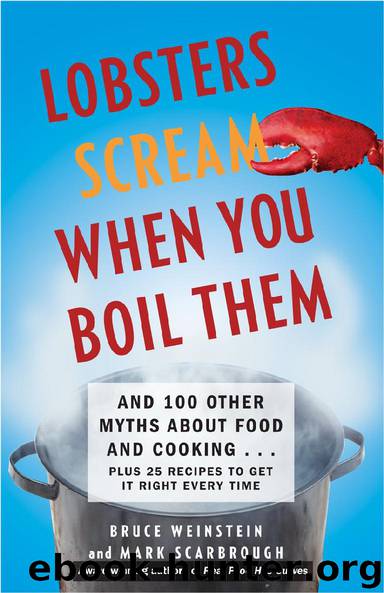Lobsters Scream When You Boil Them by Bruce Weinstein & Mark Scarbrough

Author:Bruce Weinstein & Mark Scarbrough
Language: eng
Format: epub
Publisher: Gallery Books
Published: 2011-07-15T00:00:00+00:00
PEELING A POTATO REMOVES THE VITAMINS.
LIFE’S RARELY THAT SIMPLE.
Although there’s a lot of good flavor in a potato skin, you don’t compromise the vitamins by peeling the thing. You do, however, compromise the fiber content.
A potato’s skin is a protective coating that grows thick and crusty once the tuber has been pulled out of the ground. That skin contains half the fiber in a spud. And some of the potassium—although there’s more in the spud itself. More than in most other fruits and vegetables. A medium potato has 720 mg of potassium; a large banana, 400 mg. Has your doctor told you to eat a banana because of heart issues? Try French fries!
So what’s left in the potato without its fibrous skin? Plenty of iron, vitamin B6, niacin, folate, riboflavin, magnesium, manganese, phosphorus, and C—most of which is bunched in a vein just below the skin. If you peel that tuber with shallow cuts, you’ll keep these nutrients intact.
Some people claim that if you boil potatoes with their skins on, they’ll retain more vitamin C. In fact, they’ll retain little. Vitamin C is destroyed by heat. It doesn’t matter whether those spuds were wearing their jackets in the boil.
Unfortunately, there can be bad stuff on a spud not destroyed by heat. That is, the green stuff, a.k.a. solanine, a mild poison that develops as certain natural chemicals react to light.
Potatoes grow underground. They can become bitter and dangerous up here in the sunlight. Like your Cousin Myrtle when she’s forced to go out in public.
Solanine can cause a host of yucky problems, including a bad case of the runs. But don’t worry. You have to eat a lot of solanine. Like an enormous bowl of mashed potatoes made from only the green bits.
Still, it’s best to avoid solanine. Store potatoes out of the light in a cool, dry, dark place—like the back corner of a pantry. The less light, the fewer green spots. Avoid the refrigerator, not because of increased solanine, but because the chill turns off certain flavor compounds that will never switch back on. Also, before cooking a potato, cut out any green spots, as well as any “eyes” that have sprouted.
And one more thing while we’re clarifying myths about potatoes: new potatoes are not necessarily new. Yes, they can be early potatoes. But mostly, they’re mature, small, red-skinned potatoes. Small doesn’t mean young. We’re back to your Cousin Myrtle.
So boil or steam those spuds, mash them, and enjoy them with or without their skins. Most of the nutrition—with the exception of the vitamin C—remains intact, despite being swamped with the two sticks of melted butter you just poured into the bowl.
Download
This site does not store any files on its server. We only index and link to content provided by other sites. Please contact the content providers to delete copyright contents if any and email us, we'll remove relevant links or contents immediately.
Periodization Training for Sports by Tudor Bompa(8254)
The Body: A Guide for Occupants by Bill Bryson(5082)
The MacArthur Bible Commentary by John MacArthur(4823)
The Sports Rules Book by Human Kinetics(4379)
What It Really Takes to Get Into Ivy League and Other Highly Selective Colleges by Hughes Chuck(3752)
Marijuana Grower's Handbook by Ed Rosenthal(3677)
The Sprouting Book by Ann Wigmore(3587)
The Martian by Andy Weir(3418)
Salt, Fat, Acid, Heat: Mastering the Elements of Good Cooking by Nosrat Samin(3145)
Sapiens and Homo Deus by Yuval Noah Harari(3068)
The Bread Bible by Rose Levy Beranbaum(3066)
Harry Potter 4 - Harry Potter and The Goblet of Fire by J.K.Rowling(3061)
The Marketing Plan Handbook: Develop Big-Picture Marketing Plans for Pennies on the Dollar by Robert W. Bly(3047)
Classic by Mary Berry(3010)
Martha Stewart's Baking Handbook by Martha Stewart(2854)
Screenplay: The Foundations of Screenwriting by Syd Field(2636)
The Plant Paradox by Dr. Steven R. Gundry M.D(2611)
50 Economics Classics by Tom Butler-Bowdon(2568)
The Cambridge Grammar Of The English Language by Rodney Huddleston Geoffrey K. Pullum(2424)
